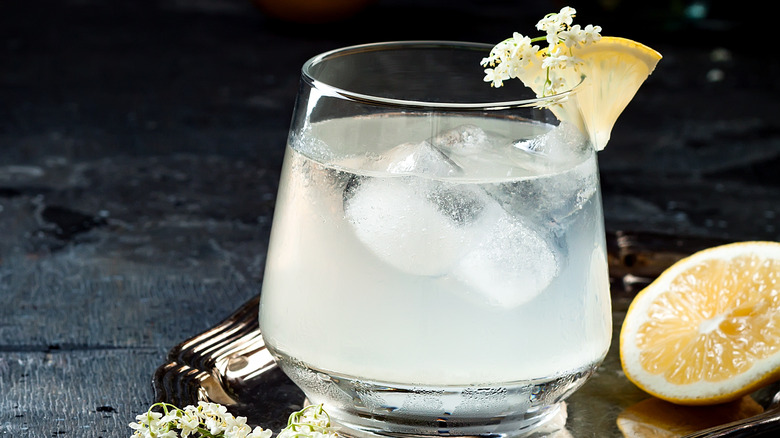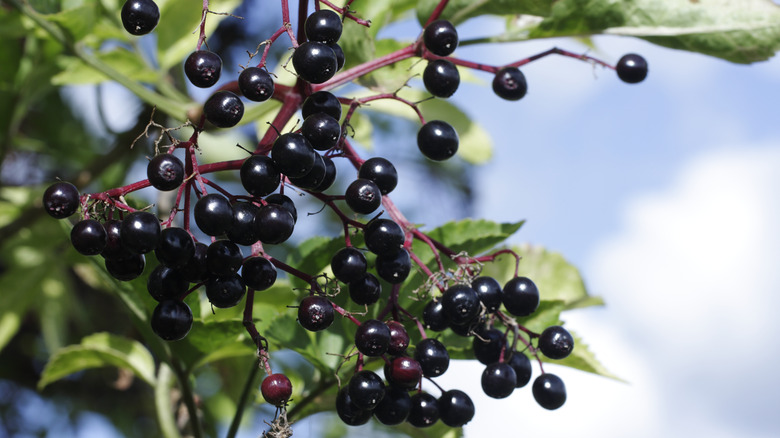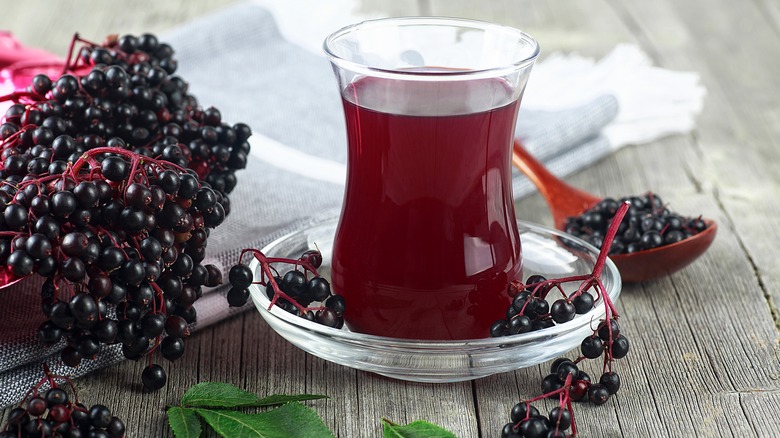The Best Fruit To Add Flavor To Your Gin
When you're sipping on a perfectly balanced gin cocktail, it's not hard to imagine how the spirit started as a medicinal tonic, touted by alchemists as "the water of life." The bold, piney taste of juniper berries — complemented by fresh citrus, soft florals, and spicy botanicals — hint at gin's healing and health-giving properties, of which it has many, even today. Given its many different tasting notes, gin provides an excellent base for cocktails, and deciphering which flavors pair best with it is an exciting exercise in finding common ground.
Plenty of fruit flavors work with gin — citrus, of course, brings out the acidic undertones while blackberries round out the sweetness of licorice and anise — but few combinations are better matched than gin and elderberries. When the fragrant, white elder flowers transition into deep purple elderberries at the end of summer, a little bit of their flowery sweetness is lost and is replaced with earthy undertones and a distinct tartness.
Because elderberries are still flower-forward, they play nicely with gin's notes of rose and lavender, bringing those sweet, floral flavors to the foreground. The berries' sourness, however, restores balance by bringing out gin's citrus notes while the berries' wild quality works well with the taste of juniper. Pairing elderberry with gin is also a nod to gin's long history of healing, as elderberry has powerful immune-boosting properties and is commonly used in traditional medicine.
Infusing gin with elderberry
Infusing gin with elderberry is a simple (if somewhat lengthy) process, at least if you plan to use fresh berries. Because they're not commonly sold in grocery stores, collecting fresh elderberries for an infusion may require some foraging. (When foraging, always be sure to identify the plant with 100% certainty, and follow ethical foraging practices by only taking up to ⅒ of a single patch's production.) Picked straight from the vine, elderberries can be bitter, and the fruit — as well as the stems, leaves, and roots — contains chemical compounds that can cause digestive upset when consumed in large quantities, per the National Library of Medicine. For these reasons, remove the berries from their stalks before infusing.
The elderberries can then be placed in an airtight jar, covered with gin, and left in a cool place for up to a month before they're strained. During that time, the alcohol will extract the berries' flavor, as well as some of their rich color and medicinal properties. Alternatively, dried elderberries, which can be found at your local apothecary, can be used in place of fresh berries for a much faster infusion. Because the dried berries are devoid of water, the potent flavor can be extracted in a matter of days rather than weeks. The elderberry-infused gin can be used in a tasty, fruit-forward Bees Knees or boost the floral flavor in a Ramos Gin Fizz.
Adding elderberry to gin cocktails
Since elderberry is somewhat bitter and mildly toxic in its raw form, muddling fresh elderberry into your cocktail isn't the best way to get more of that elderberry flavor into your gin. If you aren't ready to commit to infusing your whole bottle of gin with elderberry just yet, you might consider whipping up an elderberry syrup that can be added to your gin cocktails instead.
The Cyanogenic glycosides contained in elderberries, which have the potential to cause digestive upset in some people, can be nearly eliminated when heated, the National Library of Medicine reports. As such, simmering the elderberries in a syrup with equal parts water and sugar both sweetens the berries and makes them safer to consume. While the cooked berries can be strained from the syrup for a smoother final product that works well in a French 75 or a Hugo Spritz, the berries can also be left in for a more rustic syrup that can be used in, for example, a gin and elderberry bramble.


